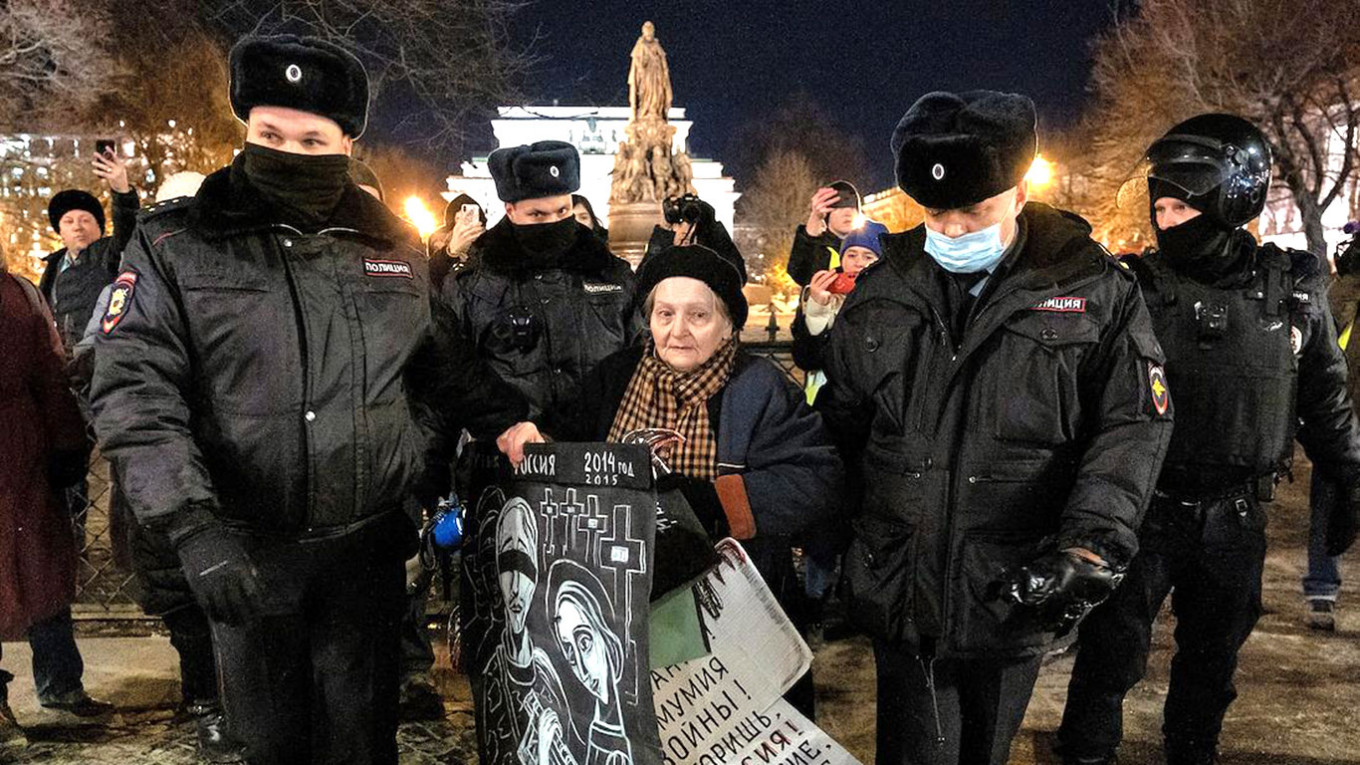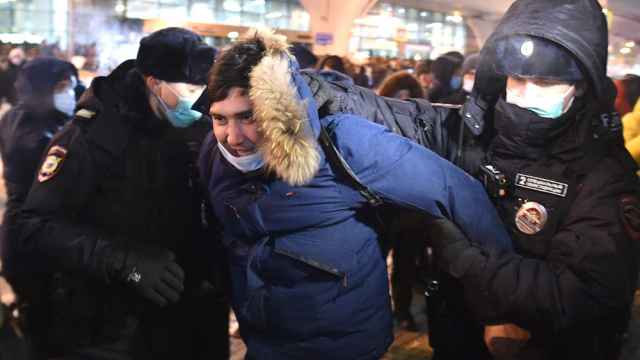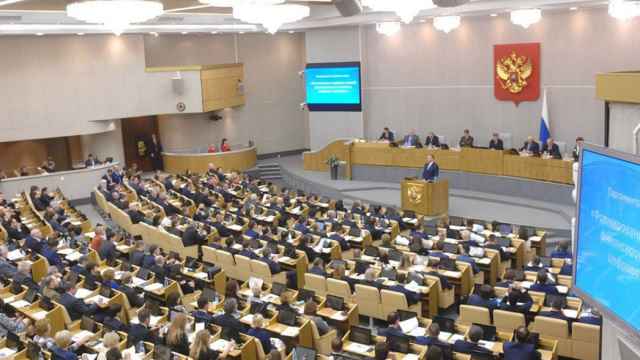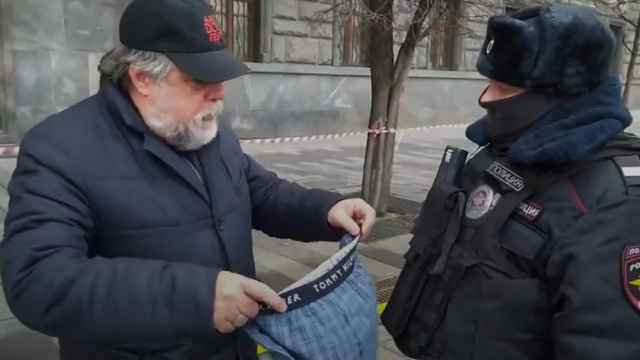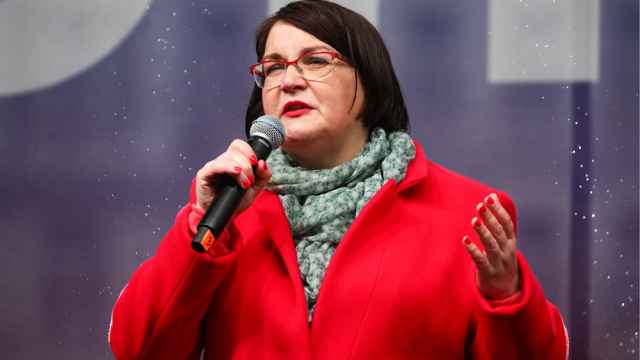Born at the tail end of World War II, in a Leningrad devastated by a brutal 900-day Nazi blockade, Yelena Osipova grew up witnessing the tragic consequences of war firsthand.
Now 77, she has become a well-known presence at protests against Russia’s invasion of Ukraine, with footage of her frequent detentions by police going viral.
Since Russian troops entered Ukraine on Feb. 24, thousands of Russians across the country have taken to the streets to protest what the Kremlin calls a “special military operation.” Some 15,000 protesters have been detained, with reports of detainees being beaten and tortured.
In Russia’s second city St. Petersburg — once Leningrad — anti-war protesters have typically gathered at Gostiny Dvor, a shopping center along the city’s main artery Nevsky Prospekt, where police presence is heavy.
Protesting Sunday at the Chernyshevskaya metro station where there was no police presence, Ospiova stood alone, wearing a bulky winter coat and holding up two big protest signs.
An artist by training and occupation, Osipova has been speaking out against injustice and tragedy in her home country for two decades.
Her first protest followed the 2002 Nord Ost siege, when militants held an entire theatre in Moscow hostage — and security forces’ use of toxic gas to neutralize the terrorists killed hundreds of civilians trapped inside the building.
“They planned for three days, and the planning resulted in storming [the theater] and human loss. Since then, I have not been silent,” Osipova told The Moscow Times.
Osipova took to the streets again in 2004 following the Beslan school tragedy in Russia’s North Caucasus. After terrorists took the school hostage, security forces stormed the building, resulting in the deaths of hundreds of schoolchildren.
“Nord Ost was the warning. And still, Beslan happened,” she said.
In more recent years, Osipova’s protests have called for freedom for political prisoners, most notably Alexei Navalny, the anti-corruption campaigner imprisoned last January after surviving a near-fatal poisoning.
Osipova also took part in the 2014 Marches For Peace that opposed Russian intervention in Ukraine following its Maidan revolution — though this movement ultimately fell apart due to police crackdowns as well as fracturing in the Russian opposition movement.
“In the past, I was connected with the opposition. But now I don’t always agree with their views. So, I go out separately, alone. It is very harmful for the movement when such disagreements happen.”
A former teacher at three art schools, Osipova stopped working a while ago, although she still holds art exhibitions from time to time.
“[With my protest signs] I’m continuing this likbez of sorts,” the activist smiled, referring to the Soviet anti-illiteracy program.
Passersby frequently stopped to speak to Osipova as she held her picket at the Chernyshevskaya metro.
“Thank you so much for taking a stand here! It takes so much courage,” one woman said.
“Thank you, I see such people here today!” she replied. “I nearly died when I heard that 70% [of Russians] support all this. See, it’s very scary.”
“It’s not true at all, the real numbers are much smaller,” the woman said. “Propaganda. Thank you and good luck!”
The anti-war protests in Russia have been met with unprecedented crackdowns. People have been detained for wearing clothes resembling the blue-and-yellow Ukrainian flag — and even for holding up blank sheets of paper.
For Osipova, being detained is nothing new: “I must have seen the inside of every police precinct in the city over all these years. Since 2002 I’ve been in all of them many times.”
Her detentions normally end in administrative fines. But as a pensioner living with a disability, she is often unable to pay them.
“Yes, they detained me and fined me. But I didn’t pay the fines. I’ve got nothing to pay them with. My pension is small. It was impossible to pay, so they started withholding money from my pension. For more than two years I’ve been getting just half of my pension. That was the way they punished me. And no appeals would work.”
She also faces poor living conditions — her apartment building had no electricity for months, and she had to navigate her way with a flashlight. But after her protests, city utility workers came to her apartment and fixed the electricity, she said.
“Now we have light at any time, day or night,” she added.
Police have also stopped detaining and fining her as often in recent days, she says, with officers simply taking photos of her protest signs before letting her go.
“The militia [old name for the police in Russia] also has humans in it. Especially the young generation. There are a lot of women in [the police force] now. They are trying to shield me, in a way.”
Osipova mentions several times that Russia’s young people are the ones who give her hope for the future.
“Can I take a picture with you?” a young passerby asked.
“As you wish… of course, as long as you don’t hold fascist and nationalistic views,” Osipova answered.
“Look at what I’m wearing. Don’t you see what it is?” asked the young man, pointing at his yellow jacket and a blue hat.
“Yes, it’s wonderful. Then you can, of course. You never know. Sometimes people come up to me… you wouldn’t believe their views.”
“I have nothing to lose,” he said. “We will win.”
Although Osipova continues to protest, she says she is skeptical about the ability of the anti-war movement to achieve change.
“So many things have already happened. It is too late. There weren’t enough mass protests. Right now, it’s best to look for other ways.”
While some passersby asked to take a picture with Osipova or offered her assistance and money (she always says she doesn’t need anything), others were more hostile.
“Look at this old person, and what is she doing?” asked a woman in her 50s as she approached Osipova with two other people her age.
“Tell me about it,” one of the woman’s friends said. “They must have paid her. Have you no shame? No shame?”
“It is you who will be ashamed soon! Very soon!” Osipova told them, raising her voice.
“They must have paid her a lot,” the first woman said.
The 77-year-old Osipova said she’s not sure how much longer she can keep up her activism. Like many other seniors in Russia, the Covid-19 pandemic forced her to self-isolate at home and miss crucial doctor appointments.
“My legs are barely moving now. We couldn’t go to the doctors, so we didn’t keep our ailments under control. I have a second-degree disability, too,” she said.
While picketing for peace, Osipova has attracted attention from Russian and international media outlets.
She says she welcomes the attention, especially on the global level, since it can raise awareness toward Russia’s anti-war movement.
In her hometown, some have even dubbed her the “Conscience of St. Petersburg.”
“I don’t like it at all,” Osipova said of the nickname. “Because people with no conscience are often using conscience as a shield, you see.”
A Message from The Moscow Times:
Dear readers,
We are facing unprecedented challenges. Russia's Prosecutor General's Office has designated The Moscow Times as an "undesirable" organization, criminalizing our work and putting our staff at risk of prosecution. This follows our earlier unjust labeling as a "foreign agent."
These actions are direct attempts to silence independent journalism in Russia. The authorities claim our work "discredits the decisions of the Russian leadership." We see things differently: we strive to provide accurate, unbiased reporting on Russia.
We, the journalists of The Moscow Times, refuse to be silenced. But to continue our work, we need your help.
Your support, no matter how small, makes a world of difference. If you can, please support us monthly starting from just $2. It's quick to set up, and every contribution makes a significant impact.
By supporting The Moscow Times, you're defending open, independent journalism in the face of repression. Thank you for standing with us.
Remind me later.


